- Home
- Balogun Ojetade
Q-T-Pies (The Savannah Swan Files Book 0)
Q-T-Pies (The Savannah Swan Files Book 0) Read online
Q-T-Pies
A Savannah Swan Files Novella
Balogun Ojetade
Copyright © 2017 Balogun Ojetade
All rights reserved.
DEDICATION
I dedicate this book to all those readers that seek great works of Black Speculative Fiction. All people deserve representation and to have their stories told and, as an author of Black Speculative Fiction, I appreciate your ongoing support and for allowing me to continue to do what I love. Black Heroes Matter!
Get Out and why Black Horror is HOT in the Trump Era
Why do we enjoy having the most negative of negative emotions… fear?
Why do we seek out entertainment in fear, disgust, or anger?
Why is the mega-popular, blockbuster Get Out so mega-popular and a blockbuster, or my novel A Haunting in the SWATS: The Savannah Swan Files, seeing more initial success than any of my other works of fiction?
Does this Era of Trump – one of burgeoning fascism, genderism, sexism and racism – have something to do with it?
It seems to me the crucial thing is that we have no need to act in response to what we fearing in Get Out. Had we been peeping through a window at Chris being hypnotized by Missy, then having his consciousness sent to “the sunken place,” we would hardly have enjoyed the experience. We would have felt we should do something – beat on the window; call 911; whoop Missy’s ass.
In A Haunting in the SWATS, we do not have to save Savannah and her son when they are attacked by a horde of African mole rats, or help her daughter when she is infected with wicked spirits posing as her ancestors.
Not having to act in response to an emotional stimulus leads to pleasure. Having to decide whether to act in response to an emotional stimulus leads to planning, not pleasure.
With Get Out and A Haunting in the SWATS and other instances of negative emotions in literature, experiencing that relaxation, knowing that we won’t have to do anything about these frightening situations, is, in and of itself, pleasurable.
Why?
Because we turn to literature, stories, poems, plays, and movies to have our emotions stimulated, even in unpleasurable ways. We do so because we experience a continuing release of psychic energy from knowing, at a cognitive level, that we do not have to act in response to those emotional signals. We know before we enter the movie theater that we will feel unpleasurable fear during the movie or the story, but we also know that we will feel pleasure, even during that fear, because we know we won’t have to do anything about it.
In this Era of Trump, we are living a horror show and our gut tells us we will have to do something about it. We might, in just a few days, be forced to join others in resisting oppression, in freeing ourselves from beneath the boot-heel of a fascist state. This is truly frightening and very unpleasurable. So, little wonder that horror is hot again with people of African descent.
Horror stories – and the understanding of why stories that scare us are attractive to us – is nothing new.
For Black folks with close familial ties to Africa, the Caribbean, and/or the Dirty South – which is damn near ALL of us – stories, beliefs and lore about death, the afterlife, ancestors, ghosts, witches, haunted places and a host of other supernatural entities and events tend to become an everyday thing.
Growing up on the West Side of Chicago had a great impact on me as I witnessed, first-hand, the horrors of murder, drug addiction, gang violence and police brutality. It is something that continues to influence my writing till date, which is why you will find elements of horror in all of my works of fiction.
In the Era of Trump, Get Out and A Haunting in the SWATS, which both deal with possession of the mind, are fitting. To be enslaved, to be oppressed, to be displaced, is to be POSSESSED – to have another have power and control over your thoughts, words and deeds.
Now, more than ever, we authors of Black Speculative Fiction should write more great horror stories; should do our part to help others experience pleasure… before the unpleasurable work of freeing ourselves is at hand.
ACKNOWLEDGMENTS
I would like to thank the authors who have inspired me to write Urban Fantasy because they write it so well: Milton Davis, Keith Gaston, Valjeanne Jeffers, Zig Zag Claybourne, Nnedi Okorafor, Daniel José Older, Jeff Carroll, M. Haynes, Steven Van Patton and Nalo Hopkinson.
CHAPTER One
Covering the special interest beat for Showin’ Out – a free Atlanta that could be found in trendy Midtown coffee houses and tattoo parlors in Little Five Points – was not the career Derrel Lacey had envisioned for himself. He had studied hard in high school, was editor of the school paper captain of the school’s State Champion basketball team. He had even won a couple of district awards for his writing and had taken second and third place in the 400 meter sprint at state finals in his junior and senior years, respectively. All of his hard work had done exactly what it had been intended to do: get him into Emory University with a full scholarship.
While at Emory, he continued to excel in his studies and in basketball. He kept the partying to a minimum and chose to pledge Alpha Phi Alpha Fraternity, instead of Omega Psi Phi – the choice of most athletes – because he wanted to be part of an organization known more for being serious Black men than party animals, jocks, or ladies’ men.
Derrel did not want to lead just a successful life but an exceptionally successful life. He also wanted people to know he could earn that success without selling out, so he rejected anything that might remotely make him look like an Uncle Tom… even his name.
He had not been born Derrel Lacey. His parents had given him the name Mike, which was way too whitebread for the life he had planned for himself. So the summer before his freshman year at college, Mike legally became Derrel – pronounced duh-RELL. The name Derrel Lacey sounded successful, strong and blacker than the Ace of Spades. He retained the ‘M’ from Mike so that his bylines would read M. Derrel Lacey. Who wouldn’t trust and want to read a story written by someone with such a cool ass name?
Derrel had his sights set on a writing career. His plan was to start out in journalism, covering politics. He accepted that he would probably have to start out covering the local news – fires, floods, and traffic jams; maybe some fluff – but New York was his ultimate goal. Derrel wanted to be a bestselling author – the kind who wrote stories about the corporate and political intrigue of the nation and the men and women who made that intrigue happen. Then, after a few years, he would rub elbows with New York power brokers and maybe even a president or two, he would settle down to write his memoirs and their exposés. He knew he had at least a Pulitzer in him, maybe even a Nobel.
Derrel held himself in very high esteem. It was hard not to; he was that good… or so he thought.
Derrel had sacrificed everything upon the altar of ambition, and what had been his reward? Working as a beat reporter for a free newspaper that covered the local art and music scene.
He had been lied to, and he felt cheated. By the time he had graduated – with honors, of course – the newspaper and magazine business was on life support. Print journalism had been murdered by the microchip. The massive hurricane called the Internet had destroyed entire publications and brick and mortar bookstores and their staff, leaving nothing in its wake.
The simple fact was that there were no local reporting jobs up to his demanding standards to be had. For a short moment, Derrel considered joining the stampede of teenagers, stay-at-home moms, and pseudo-intellectuals who had started blogging. But the thought of becoming one of the faceless thousands – maybe tens of thousands – infesting the Internet, with no way to assure the online masses would find him and his u
nique voice, made him ill.
That is how M. Derrel Lacey – honor student; basketball and track star; wordsmith extraordinaire – found himself standing in a Southwest Atlanta – the SWATS, Atlanta residents called it – parking lot in the blazing heat of a Dirty South summer, waiting for a pop-up restaurant to set up shop.
Derrel did his best to ignore the heat, focusing his attention on his current assignment. Pop-up restaurants had become all the rage in Atlanta. Supposed “gourmet”-quality food served out of a former factory, or the tool shed at the back of someone’s house was not Derrel’s idea of good eats. But his editor had told him to cover the story, and so here he was. The crowd that was gathering surprised him a little. There seemed to be an abundance of Black professionals. Many wore expensive suits and shoes and, from the snatches of conversation he heard, seemed to be educated and have jobs that actually mattered.
Maybe he could create an interesting angle to this pop-up restaurant story after all. He scanned the lot once more. Two school buses – one short, the other a standard 66-passenger one – served as Que-T-Pies, a restaurant that specialized in gourmet barbecue pot pies. Derrel surmised that the small bus served as the kitchen and the large bus served as the dining area.
Both buses, painted carnation pink and purple, were definite attention grabbers, but it was the young ladies running the restaurant that drew Derrel over for a closer look.
They were all twenty-something and gorgeous. One had a short, curly afro and the other two had dreadlocks that fell past their shoulders. All three had smooth skin the color of sable. They were dressed in what must have been Que-T-Pies’ idea of a uniform: a purple pencil skirt, tight, pink tank top, and pink Chuck Taylor gym shoes.
Derrel smiled; he had found an angle for his story that would at least keep him interested. He straightened his shirt, checked his breath in the palm of his hand, shook his head, then tossed an Altoid into his mouth, then he walked past the long line that was forming in front of the pink and purple restaurant on wheels.
As Derrel drew closer to the front of the line, it became apparent that the three ladies of Que-T-Pies were not just fine as hell; they were the closest thing to perfection that he had have ever seen. As ridiculous as it seemed, these sisters looked like they had been crafted in a lab that turned out ultimate human specimens. Sure, natural selection could and did produce beautiful people, but this… this was different. It was as if some mad scientist had combined every desirable human trait and the result had been these three women.
Derrel knew he was staring but could not help himself. From the reaction of the other people in line, he was not alone. Both men and women seemed to be drawn to the three trio of beauties like bees to honey. A couple of the soon-to-be customers grumbled at him as he passed, thinking that he was line jumping.
The short haired sister taking orders at the head of the line pouted at him as he walked up. Derrel was six foot one, and she was only an inch shorter. It was her eyes, though, that froze Derrel in place. They were almond-shaped and they were bright winter gray. He thought at first that she might be wearing contacts but quickly dismissed the thought. No, this heavenly creature was all natural; it was something he knew instinctively. She fixed him with those blazing gray eyes, her mouth still in a pout.
Derrel was not surprised that when she spoke, her voice was husky and arousing.
“Sweetie, you’re cute,” she said, eyeing him up and down. “But everyone has to wait their turn.” She nodded at the long line.
Derrel fumbled in his pocket for a card. “I’m a reporter. I would love to do a story on you and your restaurant.”
Her pout turned into a dazzling smile. She accepted the proffered card. Derrel could not be certain, but she seemed to let her fingers linger against his hand a tad bit longer than necessary.
“A story? On us?” She said, holding his gaze. “How wonderful!”
Derrel was not sure he had enough willpower to stop staring into those eyes. No, he would be content to stand there forever if he could just look at her.
“Why don’t you go in and have a seat?” She pointed toward the big bus. “I’ll be over in a minute. You can observe and throw out any questions you may have. I can multitask.”
“Sure. Great,” Derrel stammered.
“Well,” she looked down at his card, “M. Derrel.”
“Yes. That’s me, but it’s just Derrel.” He forced a smile but wanted to cringe away in embarrassment. What was wrong with him? He sounded like a twelve-year-old geek trying to ask his crush to the school dance.
”I’m Chioma, by the way, and my two partners in crime up in the short bus are Ini – she’s the one on the grill – and next to her is Damilola, our resident chef extraordinaire.”
Chioma turned then shouted up to get the attention of the other two women. “Sisters, we have a handsome,” she winked at Derrel, “reporter out here who wants to do a story on us. What do you think?”
Ini poked her head out of one of the windows and said “I think he can have anything he wants… on the house.”
“You heard her, M. Derrel. You can have anything you want. So what’s it going to be?” Chioma asked, wetting her lips with her tongue, waiting.
Derrel made sure he had control of his voice before answering. “I’ll have whatever your specialty is.”
“A number one… extra spicy!” Chioma shouted up the order.
She turned back to Derrel. “Go on inside. I’ll bring your food in a few minutes.”
Derrel was glad when Chioma turned her attention back to collecting money from the customers who had already placed their orders. He climbed up into the long bus and he had to literally catch his breath at the sight. The bus’ seats had been removed and replaced with several mahogany tables that ran the length of both sides. Each table had four chairs, carved from the same wood as the tables. The walls were covered in plush oxblood leather.
They spent a lot of money… on a pop-up? He thought.
Derrel slumped down into a chair at the back of the bus.
His complete overreaction to the women confused him. Derrel did not suffer from false modesty; he knew he was an attractive man and had been on the receiving end of attention from good-looking women before, but this was different.
Derrel was smart enough to understand that Chioma was a saleswoman. She probably flirted with all of her male customers and quite possibly some of the female ones as well. But that did not explain what he was feeling. It was like he was drawn to her on some primal level. A deep part of him desired to be close to her. It was a bit unsettling, because he did not like the feeling of being out of control.
The bus quickly filled with patrons. Derrel watched Chioma work, but more importantly, he watched the other customers interact with her. They all seemed to have the same kind of reaction that he had. It was like watching a bunch of children swarm around an ice cream truck that just rolled down the block on a hot day in June. They were excited, almost giddy, when Chioma brought plates and drinks to their table and granted them a minute or two of conversation.
Derrel pulled out his phone to snap a few pictures. Chioma with the customers—click. The Que-T-Pies interior—click. A couple of wide shots that included some of the other patrons enjoying their pot pies—click.
The digital age had not only brought the print journalist to the edge of extinction, but through collateral damage, it had also taken out many other professions, including the news photographer.
When there was finally a lull in the influx of customers, Derrel jumped into question mode.
“So, I get the barbecue part, but pot pies?” Derrel asked, pocketing his phone. “Are pot pies really a thing?”
Chioma placed a potpie before him. “You tell me.”
Derrel stabbed his fork into the pies top crust. The pie did not sink the way it usually did with those frozen pot pies he bought from the grocery store. Derrel lifted his fork out of the pie, bringing along a thick piece of chicken breast, a hunk of macaroni
and cheese and some collard greens.
“Wait. What?” Derrel gasped. He stared at the fork before him then at Chioma. He smiled. “What manner of sorcery is this?
“That,” Chioma began, pointing at Derrel’s pie. “Is the BBQ Chicken Pie… herb roasted, barbecue chicken breast with southern macaroni and cheese, and down home collard greens.
“Hey, Chioma, Derrel’s drink is up.” Ini’s voice came through the phone hooked over the waistband of Chioma’s skirt.
Derrel slid the fork into his mouth… then his taste buds exploded. He immediately chomped down again, stuffing his entire mouth with spicy,smoky goodness. It was a total cliché, but all he could think was that he had never tasted anything like this pie. The Que-T-Pies ladies had somehow managed to create a spicy barbecue sauce for the chicken that was also sweet, so instead of burning the tongue, it kind of… tingled. The chicken was slide-off-the-bone-tender and the greens and macaroni were even better than what his grandma made every Thanksgiving. Derrel could not eat fast enough. He kept stuffing bites into his mouth even before swallowing what he was already chewing on.
“Slow down, M. Derrel.” He looked up at Chioma, who had sidled up to him, drink in hand. “I don’t want you to choke. It would be bad for business.”
He had not even noticed Chioma leave to retrieve his drink. “This is the best thing I’ve ever tasted,” Derrel said around a mouthful of pot pie.
“I know it is, and if you slow down, you’ll enjoy it longer.”
“I need to order another one.”
“Whoa there, bruh,” Chioma said, patting his chest with her palm. “Finish what you’ve got. Trust me, you won’t be able to eat a second pie; they’re very filling.”
“Wanna bet?”
“I’ll tell you what. I’ll get you another one, but save it for later. They reheat perfectly,” said Chioma, her gray eyes communicating she was not asking.

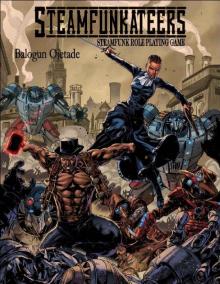 Steamfunkateers
Steamfunkateers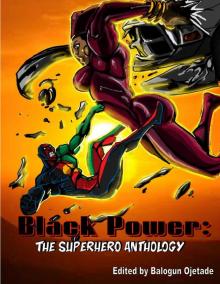 Black Power- The Superhero Anthology
Black Power- The Superhero Anthology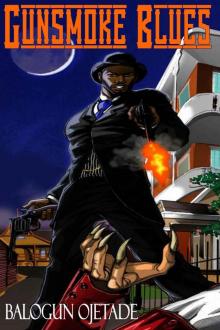 Gunsmoke Blues
Gunsmoke Blues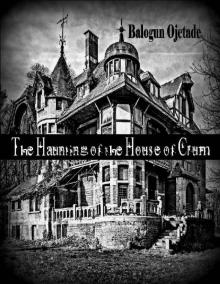 The Haunting of the House of Crum
The Haunting of the House of Crum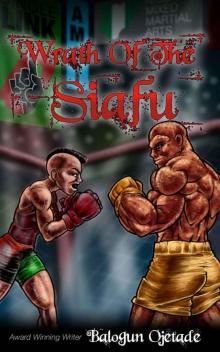 Wrath of the Siafu- A SIngle Link
Wrath of the Siafu- A SIngle Link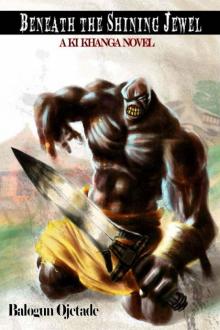 Beneath the Shining Jewel
Beneath the Shining Jewel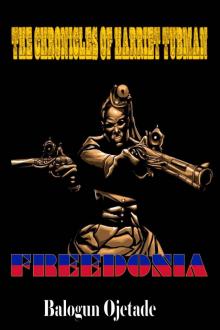 The Chronicles of Harriet Tubman- Freedonia
The Chronicles of Harriet Tubman- Freedonia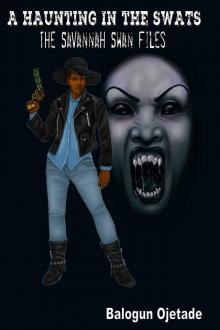 A Haunting in the SWATS (The Savannah Swan Files Book 1)
A Haunting in the SWATS (The Savannah Swan Files Book 1)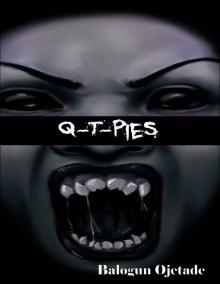 Q-T-Pies (The Savannah Swan Files Book 0)
Q-T-Pies (The Savannah Swan Files Book 0)